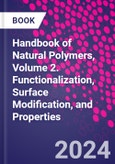The Handbook of Natural Polymers, Volume Two: Functionalization, Surface Modification, and Properties covers modifications, functionalization, analysis and properties of polymers from natural sources. The book begins by introducing the current state-of-the-art, challenges and opportunities in natural polymers. This is followed by detailed coverage of methods for chemical, physical and surface modifications, and functionalization of natural polymers, including nanocellulose composites, gluten, chitin, alginate, pectin, keratin, shellac, wool, hemicellulose, lignin, natural rubber, albumin, collagen, gelatin, zein, soya protein, silk fibroin, gutta percha and gum. The final chapters explain several other key aspects, such as microscopical and spectroscopical analysis, mechanical, thermal, and more.
The book aims to offer potential avenues for the preparation, modification, and implementation of advanced natural polymer-based materials with the desired properties for specific applications.
Please Note: This is an On Demand product, delivery may take up to 11 working days after payment has been received.
Table of Contents
1. Possibilities and significance of chemical modifications of natural biopolymers State of the art2. Modifications of starch and its characterizations
3. Physical and chemical modifications of gluten
4. Chemical modifications of nanochitin and their characterizations
5. Chemical modifications of Alginate based biopolymers
6. Functionalization of pectin and structural evaluation
7. Chemical modifications of keratin
8. Treatments on wool and structural evaluation
9. Functionalization and characteristics of chitosan-gelatin composites
10. Effect of modifications on natural rubber
11. Chemical modifications of collagen
12. Chemical and radiation modification of gelatin
13. Surface modifications of zein
14. Chemical functionalization and characterization of silk fibroin materials
15. Functionalization and structural analysis of Gum
16. Production of alginate oligosaccharides and their plant growth promoting activity: Effect of ionizing radiation processing
17. Microscopical analysis of modified natural biopolymers
18. Chromatographic analysis of modified natural biopolymers
19. Thermal properties of modified natural biopolymers
20. Electrical properties of modified natural biopolymers
21. Surface analysis and water contact angle of modified modified natural biopolymers
22. Rheological and shape memory properties of natural biopolymers
23. Environmental impact of chemically modified natural biopolymers
Authors
M.S. Sreekala Associate Professor, School of Chemical Sciences, Mahatma Gandhi University, Kottayam, Kerala, India, and Joint Director, International and Inter-University Centre for Nanoscience and Nanotechnology and School of Nanoscience and Technology, Mahatma Gandhi University, Kottayam, Kerala, India. Dr. M. S. Sreekala is a Associate Professor at the School of Chemical Sciences. She is also serving as the Director of the School of Polymer Science and Technology and Joint Director of the School of Nanoscience and Technology and International and Inter University Centre for Nanoscience and Nanotechnology, Mahatma Gandhi University (MGU), Kerala, India. Lakshmipriya Ravindran Assistant Professor, School of Energy Materials, Mahatma Gandhi University, Kottayam, Kerala, India. Dr. Lakshmipriya Ravindran is a Assistant Professor at the School of Energy Materials, at the Mahatma Gandhi University in India. She has published a good number of scientific articles in the high-impact factor international journals and one of her articles is indexed as "Top Downloaded Article� of the year. Koichi Goda Full Professor, Department of Mechanical Engineering, Yamaguchi University, Japan. Prof. Koichi Goda is Chair of Mechanical Engineering and Full Professor, in the Department of Mechanical Engineering, at Yamaguchi University, Japan. Prof. Goda has significant experience in areas including biopolymers, composite materials, reliability, and nanotechnology, with recent research focusing on green composites. He has received numerous awards for his work in including most recently the Meritorious Contribution Award from JCOM (Committee on Composite Materials of JSMS - The Society of Materials Science, Japan) in 2018, and the JSMS Award for Distinguished Service to Chugoku Branch in 2020. Sabu Thomas Professor and Director, International and Interuniversity Centre for Nanoscience and Nanotechnology, Mahatma Gandhi University, India.Prof. Sabu Thomas is a Professor of Polymer Science and Engineering and the Director of the School of Energy Materials at Mahatma Gandhi University, India. Additionally, he is the Chairman of the Trivandrum Engineering Science & Technology Research Park (TrEST Research Park) in Thiruvananthapuram, India. He is the founder director of the International and Inter-university Centre for Nanoscience and Nanotechnology at Mahatma Gandhi University and the former Vice-Chancellor of the same institution.
Prof. Thomas is internationally recognized for his contributions to polymer science and engineering, with his research interests encompassing polymer nanocomposites, elastomers, polymer blends, interpenetrating polymer networks, polymer membranes, green composites, nanocomposites, nanomedicine, and green nanotechnology. His groundbreaking inventions in polymer nanocomposites, polymer blends, green bionanotechnology, and nano-biomedical sciences have significantly advanced the development of new materials for the automotive, space, housing, and biomedical fields. Dr. Thomas has been conferred with Honoris Causa (DSc) by the University of South Brittany, France.








